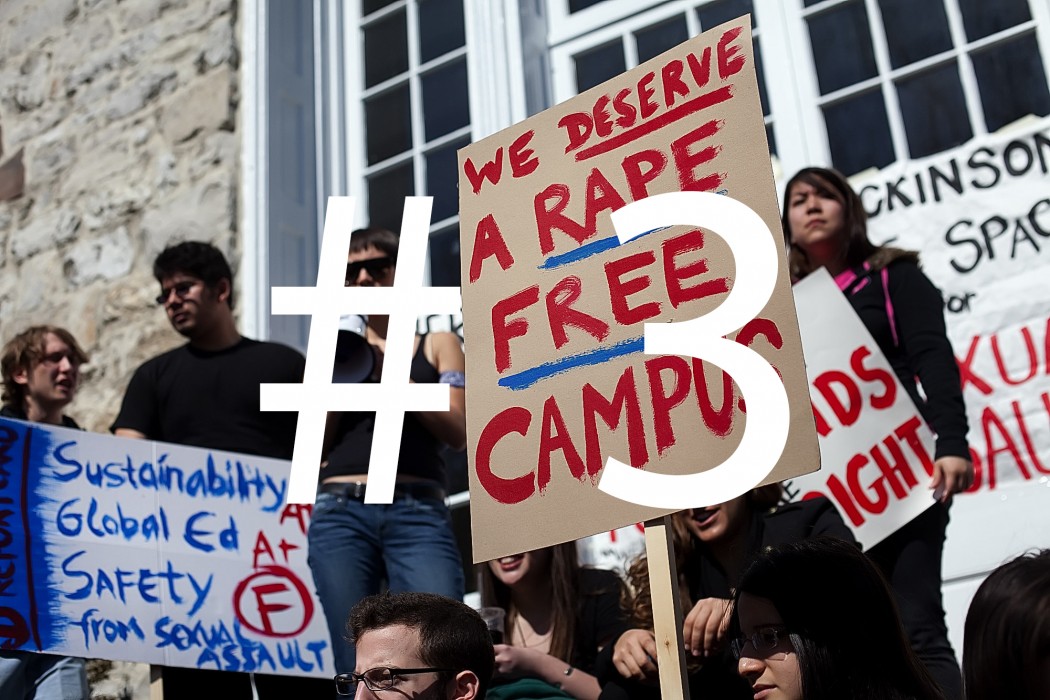In January 2014 President Obama made a statement that caused a backlash. He claimed one in five women in college experience some sort of sexual assault. Later in that year Vice President Biden said schools had a “moral responsibility” to get to the bottom of this crisis. Though many took issue with Obama’s numbers, siting less than rigorous studies on the matter, the presidential attention helped catapult the issue to the national stage.
This week, the Association of American Universities, released data from a poll of more than 150,000 students at 27 top universities conducted last spring, as a response to this call for action.
By their senior year, 26.1% of women had experienced penetration or sexual touching—which could include kissing or groping—as a result of physical force or incapacitation, the survey found. Freshmen were the most vulnerable, with 16.9% reporting such an incident; the rate steadily declined each year to 11.1% for seniors.
In a 2011 letter to every U.S. college, the Education Department told schools they risked federal investigation and financial penalties if they didn’t protect students from sexual harassment and violence under Title IX of the Education Amendments of 1972, which requires gender equity.
Harvard University President Drew Gilpin Faust called the results “deeply disturbing.” Among female seniors, 16% said they had “experienced penetration or attempted penetration without their consent during their years in college.”
“I find it extremely distressing to read these survey results, as I know others will,” Ms. Faust said in a statement. “But we must confront the realities documented by the survey as we develop a comprehensive effort to combat sexual assault, one that engages our entire community in a sustained and effective manner.”
“I am deeply distressed—as I know you are—by many of the survey findings,” wrote Yale President Peter Salovey. “These numbers, and others revealed by the survey, are extremely disturbing. The prevalence of such behavior runs counter to our most fundamental values. It threatens individual students, our learning environment, and our sense of community.”
About 28% of incidents were reported to authorities, according to the survey. More than half of the victims of even the most serious assaults say they didn’t file a report because they didn’t consider it “serious enough.”
A bit less than half of the students said they had witnessed an intoxicated person “heading for a sexual encounter,” the survey said. Most didn’t try to intervene, it said.
At Yale, 18.1% of undergraduates “experienced an incident that involved force or incapacitation.” Women were three times as likely as men to report a sexual assault and 74% of undergraduate women reported at least one incident of sexual harassment since arriving at the school.
“I am deeply distressed—as I know you are—by many of the survey findings,” wrote Yale President Peter Salovey. “These numbers, and others revealed by the survey, are extremely disturbing. The prevalence of such behavior runs counter to our most fundamental values. It threatens individual students, our learning environment, and our sense of community.”
About 28% of incidents were reported to authorities, according to the survey. More than half of the victims of even the most serious assaults say they didn’t file a report because they didn’t consider it “serious enough.”
A bit less than half of the students said they had witnessed an intoxicated person “heading for a sexual encounter,” the survey said. Most didn’t try to intervene, it said.
ONE NOTE HERE: We went to the actual survey and found this:
- “When asked what might happen when a student reports an incident of sexual assault or misconduct to a university official, about half say that it is very or extremely likely that the university will conduct a fair investigation. The percentage is lower for those groups that are most likely to report victimization (i.e., females and those identifying as TGQN). Similar percentages are evident for opinions about other types of reactions by the university (e.g., officials would take the report seriously; protect the safety of the student; take action against the offender)”
This is relevant, because it is being reported that half of those surveyed say the believe a university would conduct a fair investigation, when actually that figure decreases when the group (women & TGQN) who are most likely to be in the position of reporting the offense are asked.
Likewise this is what respondents who had experienced sexual assault or misconduct reported:
- “The most common reason for not reporting incidents of sexual assault and sexual misconduct was that it was not considered serious enough. Other reasons included because they were “embarrassed, ashamed or that it would be too emotionally difficult,” and because they “did not think anything would be done about it.”






